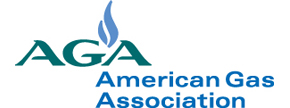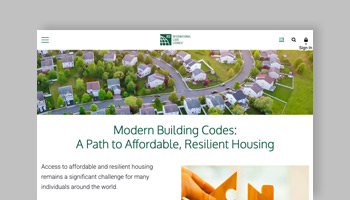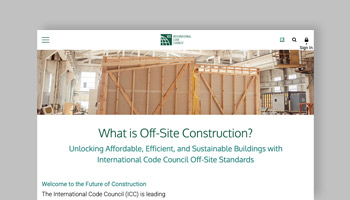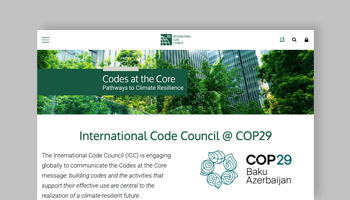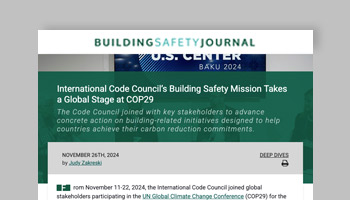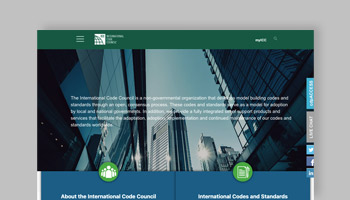
Building safety doesn’t stop after the fourth quarter or ninth inning – staying up-to-date on the latest building safety trends and technologies is crucial in keeping our homes and communities safe! Here we take a look at some hot topics in the building safety industry, including artificial intelligence, global trends and more.
It’s not too late to join the Building Safety Month conversation – tag the International Code Council on social media, and use #BuildingSafetyMonth2025 and #BuildingSafety365 to help spread the word!
Artificial Intelligence

Artificial intelligence is crucial for sports analytics and predicting trends and outcomes, but it’s becoming more and more prevalent in building safety, too! As Generative Artificial Intelligence (GenAI) continues to evolve, it is driving major improvements in the building safety industry. GenAI Integration into the industry empowers professionals and organizations by providing enhanced tools to assess data, improve processes and enhance overall safety measures.
- Building safety professionals can leverage GenAI-powered systems to perform high-powered searches of regulations, case studies and building codes in seconds, helping them make quicker and more informed decisions in the field.
- GenAI can spot patterns and provide risk assessments, enabling professionals to identify vulnerabilities before they lead to potentially dangerous situations.
- With GenAI, issues such as structural stress, environmental hazards or equipment malfunctions can be diagnosed quickly, allowing building safety professionals to take corrective actions, minimizing potential damage and ensuring buildings remain safe.
Building Codes Save

One of the most cost-effective ways to safeguard our homes and communities against disasters is to adopt and follow hazard-resistant building codes. Not only are causalities reduced, but the cost of structure damage is also reduced during a disaster. Plus, updating existing homes and buildings to modern building codes can reduce utility bills, insurance premiums, and repairs and maintenance all without impacting housing affordability.
- Studies show that current codes save $11 in mitigation benefits for every $1 invested.
- Research shows that modern building codes have minimal impact on housing costs, adding less than one percent to construction costs in most cases while significantly reducing repair costs and risks from natural disasters.
- New construction practices, like off-site construction (also known as modular or prefabricated construction), offer a residential and commercial building solution that is not only faster and more cost-effective, but also environmentally sustainable.
Global Emissions Reduction and Resilience

The buildings and construction sector contributes approximately 40 percent of global greenhouse gas emissions according to the Global Alliance for Buildings and Construction (GlobalABC). The Buildings Breakthrough campaign, supported by the Code Council, helps to support governments in achieving near-zero emission and resilient buildings by 2030. The Code Council is actively working with stakeholders around the world to address climate mitigation and emissions reduction.
- 50 percent of the buildings in the emerging economies of the Global South that will be standing in 2050 have not yet been built, and most of those will be constructed primarily in the heavily urbanizing regions of Africa and Asia. It's imperative that these buildings be resilient against future hazards and be as energy efficient as possible.
- Countries around the world are facing the immediate need to adapt their built environments to protect against growing weather-related threats like extreme heat, wildfires, flooding and high wind events.
- Over 80 countries signed the Chaillot Declaration at the inaugural Buildings and Climate Global Forum held in March 2024, recognizing the value in global collaboration to address common resilience and sustainability challenges, including the importance of resilient and right-sized building regulations, capacity building for effective compliance, and strong standards and reliable data.
Spread the Word



